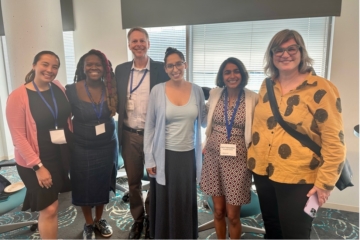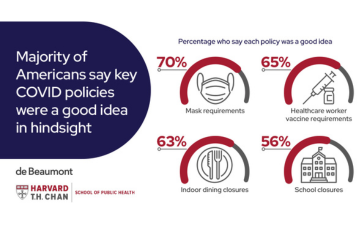
Through the PHRASES project (Public Health Reaching Across Sectors), the de Beaumont Foundation and the Aspen Institute’s Health, Medicine and Society Program worked with the FrameWorks Institute and Hattaway Communications to understand perceptions of public health professionals and their work among leaders in business, education, housing, and health systems and to develop tools to improve communication with all audiences. Research included in-depth interviews and focus groups with leaders in these and other fields, as well as community members.
The PHRASES and Hattaway research revealed insights about what types of framing and messaging work most effectively to build understanding and support. Among other insights, FrameWorks’ research identified three effective ways to talk about public health:
- The Foundation of Community Health metaphor, underscoring that community health relies on a strong, multi-sector foundation.
- The GPS Navigation metaphor, illustrating how public health uses data to suggest pathways toward better community health.
- The Value of Investment statement, explaining that collaboration with public health produces both short- and long-term benefits.
The PHRASES tools include:
- Strategic messaging
- “Winning Words” that most effectively build support for public health
- Storytelling tips
- “When You Say… They Think,” explaining how commonly used phrases in public health are perceived, with recommendations for reframing
- Sample email language to initiate new partnerships
“Strong partnerships start with strong communication,” said Brian C. Castrucci, DrPH, president and CEO of the de Beaumont Foundation. “Our research with the FrameWorks Institute revealed a disconnect between public health and other sectors, and that translates to the way health departments communicate with the public as well. The PHRASES tools are intended to help explain the role and value of public health in order to build stronger partnerships.”
Ruth J. Katz, executive director of the Aspen Institute’s Health, Medicine and Society Program, said, “The COVID-19 pandemic has clearly demonstrated not only the relevance and significance of public health in and of itself, but also the need for public health to partner with other sectors such as education, housing, business, and hospital systems to achieve shared goals. To build transformative collaboration and support, we must equip public health leaders with the skills and resources necessary to effectively communicate the value of their work to those outside the profession. We are excited and proud that PHRASES’ evidence-based toolkit will advance that objective.”
Nat Kendall-Taylor, CEO of the FrameWorks Institute, said, “Advancing issues like public health and building stronger collaborations requires communicators to know both what they are up against and what strategies they can use to navigate existing understandings. This research used cutting-edge social science methods to do both of these things. The resulting toolkit supports evidence-based communications and helps the field of public health and its practitioners advance key ideas and solutions.”
For more information and to explore the tools, visit www.phrases.org.




